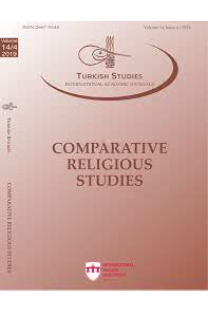Meister Eckhart Düşüncesinde Lütuf Tecrübesi ve Kutsal’a Dönüşüm*
Geç Orta Çağ döneminin etkili figürlerinden biri olan Alman Dominik Meister Eckhart, bir vaiz, mistikve teolog olarak ortaya koymuş olduğu eserleriyle felsefi ve teolojik birtakım tartışmaların zemininihazırlamıştır. Felsefenin temel konularından biri olan mistisizm konusunda savunduğu bazı görüşler yüzündenpapalık fetvasıyla kınanacak ve kâfir ilan edilecek kadar da kilisenin dikkatini çekmiş bir isimdir. İnsanı “özünedönmüş olan” olarak tanımlarken, ilahi bir müdahale ve lütufla, kişinin bu dönüşüm sürecinin sonundaTanrı’nın oğlu hatta daha da ileri giderek Tanrı’nın kendisi olacağını ifade eden Eckhart, her ne kadar teorikanlamda bir aşama ve kademelilik fikrinden bahsetmese de pratik anlamda birtakım çaba ve disiplin gerektirenhallerden bahsederek, bu dönüşümün yolunu dinleyicilerine göstermeyi başarmıştır. Negatif teolojiyibenimseyen Eckhart, takipçilerine Tanrı hakkında konuşmaktansa susulmasını önermiş olsa da Aristo’nun“benzeri benzer bilir” ilkesinden hareketle, insanın Tanrı hakkında bir şeyler bilebilmesi için kutsal bir dönüşüm geçirerek Tanrı’laşması gerektiğini ileri sürmüştür. Tanrı’yı tek gerçek varlık kabul ederken, Tanrıdışında yaratılanları bir hiç olarak değerlendiren düşünürümüz, insanın varlık sahasına çıkması ve varlıkkazanabilmesi için bu dönüşüme muhtaç olduğunu ifade etmiştir. İki tür lütuftan bahseden Eckhart, bedelsizolarak verilen ve Tanrı’dan çıkış olarak ifade ettiği yaratımın ilk lütuf olduğunu ve herkese verildiğini, Tanrı’yadönüş olarak ifade ettiği ikinci lütfun ise sadece zeki ve anlayış sahibi olup, bu dönüşüm için çaba sarf edenlereverileceğini belirtmiştir. Bu dönüşümü soyutlanma, aydınlanma, özdeşleşme ve atılım olmak üzere dörtaşamada geçekleştirebilecek olan insan, bir nevi aslına, özüne rücu etmektedir.
Experience of Grace and Godification in Meister Eckhart’s Thought
German Dominican Meister Eckhart, who is one of the most efficient figures of Late Medieval Era, established a ground for a set of theological and philosophical discussions with his works he produced as a preacher, a mystic and a theologian. He is a person who drew the attention of the Church because of a number of opinions he advocated about mysticism which form the main subject of philosophy, and he was therefore condemned by a papal bull and was even deemed heretic. Having defined human as the one “turning back to his essence” Eckhart, who states that human being will become the Son of the God, and going even further that he will become the God Himself, does not theoretically mention an idea of gradualness or phases, however he succeeds in presenting the way of this change by mentioning states which require a certain amount of effort and discipline. Having adopted negative theology, Eckhart, despite advising his followers to keep quiet about God rather than speaking about Him, asserted that in order for a human to know something about God, he must Godify himself by experiencing a divine transformation moving from Aristotle’s principle of “the experience or recall of one object will elicit the recall of things similar to that object”. The thinker, who appreciates created beings as nothing except God, while considering God as the only real existence, expresses that so as for human beings to show up in the field of existence and to be able to exist, they rely on this transformation. Having mentioned two graces, Eckhart remarks that the Creation which is given without any charge and which he calls exitus from God is the first grace and it is granted to all, and that the second grace, which he reflects as reditus to God, is to be given to only those who are smart and have intelligence, and do their diligence for this transformation. Human being, who can realize this transformation in for stages, namely detachment/purification, illumination, union/ecstasy and springing, in some way returns to his self, his essence.
___
- Aumunn, J. (1994). Christian Spirituality in the Catholic Tradition, Fourth impression.
- Can M. (2018). “Objektivist Etik ya da Rasyonel Bencillik Ahlakı”, Atatürk Üniversitesi Sosyal Bilimler Enstitüsü Dergisi, 22, 2287-2299.
- Huxley, A. (2014). Kadim Felsefe, Çev. Mutlu Yetkin, İthaki Yayınları.
- Dilek, S. (2012). “Meister Eckhart -Teolojisinde Yaratılış Ve Ruh”, Kutadgubilig, 22, 239-263.
- Eckhart, M. (1990). Tanrı ve İnsan, Çev. Sedat Umran, Madde ve Ruh Yayınları.
- Eckhart, M. 2(2003). Ben, Meister Echkhart, Tanrı’nın Kendisinden Hiçbir Şey Saklamadığı Adam, Der. David O’neal, Çev. Aslı Özer, Klan Yayınları.
- Eckhart, M. (1986). Meister Eckhart Teacher and Preacher, Translation and Introduction By Edmund Colledge O.S.A, Bernard McGinn and Elvira Borgstadt, Poulist Press.
- Eckhart, M. (1993). Meister Eckhart Werke 1, Texte und Übersetzungen von Josef Quint, Herausgegeben und kommentiert von Niklaus Largier, Frankfurt am Main.
- Eckhart, M. (1994). Selected Writings, Selected and Translated by Oliver Davies, Penguin Books.
- Eckhart, M. (2009). The Complete Mystical Works of Meister Eckhart, Translated and Edited by Maurice O’C. Walshe, Revised with a Foreword by Bernard McGinn, Crossroad Publishing.
- Eckhart, M. (1981). The Essential Sermons, Commentaries and Defense, Translation and Introduction By Edmund Colledge O.S.A And Bernard McGinn, Poulist Press.
- James, W. (19854). The Varieties of Religious Experiences; A Study In Human Nature, Penguin Books.
- Kahveci, K. (2014). Bir Mistik Düşünür Meister Eckhart, Eser Basın Yayın Dağıtım Matbaacılık.
- Yılmaz, Ö. (2014). Alman Mistik Düşüncesi, İnsan Yayınları.
- Zarrabi-Zadeh, S. (2016). Practical Mysticism in Islam and Christianity A comparative study of Jalal al- Din Rumi and Meister Eckhart, First published by Routledge.
